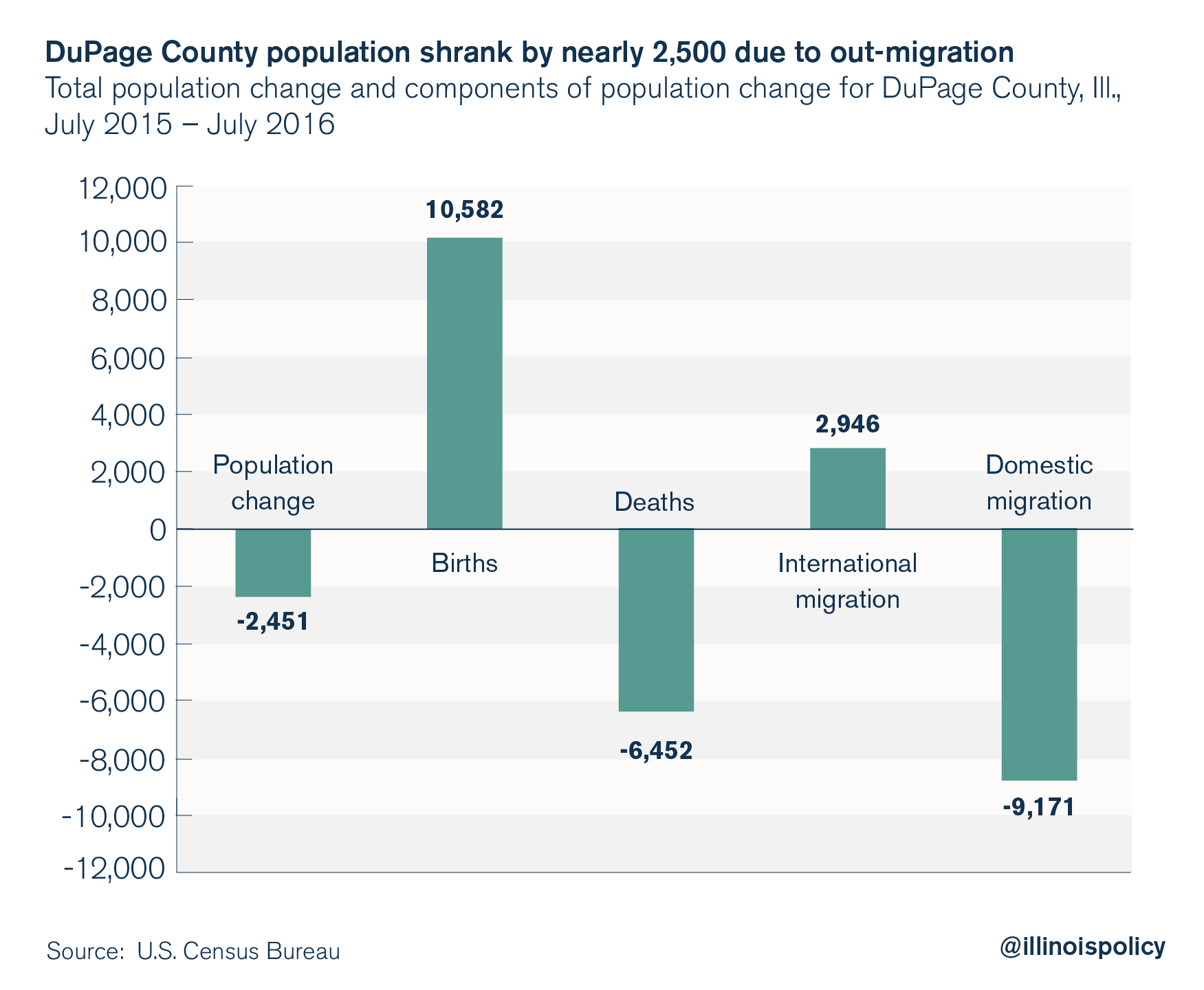DuPage County population shrank by nearly 2,500 from 2015-2016
Newly released census data show more than 9,100 DuPage County residents moved to other U.S. locales last year, causing the county’s population to shrink.
DuPage County’s total population shrank by 2,451 people from July 2015 to July 2016, according to newly released census data.
Why has DuPage experienced a net drop in its population? The answer is simple: People are leaving DuPage for other parts of the country. DuPage’s domestic migration loss surpassed the county’s gains from having more births than deaths and from international immigration.

The July 2015 – July 2016 timeframe marks the second consecutive year DuPage’s population has shrunk. The county also had a net population loss of 33 residents from July 2014 to July 2015. DuPage lost 7,431 residents to domestic migration from 2014 ̶ 2015, which surpassed the 3,538 residents it gained from international migration, as well as from having more births than deaths.
Unfortunately, DuPage County’s population loss mirrors the rest of Illinois. Ninety-three of Illinois’ 102 counties experienced net out-migration from 2015 to 2016, and 89 of Illinois’ 102 counties have shrinking populations.
Along with DuPage, the other collar counties surrounding Cook County in Northeast Illinois – Lake, Kane, McHenry and Will – also saw net domestic out-migration. DuPage, Cook, Lake and McHenry counties had enough domestic migration losses to cause their populations to shrink.
In Cook County, domestic out-migration – which has doubled over the last five years – caused the population to shrink by more than 21,000 people from 2015 to 2016.
High taxes drive people out of Illinois, DuPage County
Illinois’ dysfunctional government, weak job creation and ever-increasing tax burden help explain these counties’, and the state’s, declining population numbers. A Paul Simon Public Policy Institute poll released in October 2016 found that almost half of Illinoisans surveyed wanted to leave the state, and taxes were the No. 1 reason.
Property taxes are especially burdensome, and Illinoisans pay some of the highest property taxes in the nation. Homeowners in DuPage County will see their property taxes rise by 1.76 percent on average this year, according to the Daily Herald. Homeowners deserve relief, and the General Assembly should pass a property tax freeze. But a freeze alone won’t keep a lid on property taxes.
In a state with nearly 7,000 units of local government, measures such as local government consolidation can help reduce the costly bureaucracies that help drive up property taxes. DuPage County residents enjoy local government consolidation powers, and the Chicago Tribune has reported that since launching the Accountability Consolidation Transparency Initiative in 2012, the county has taken steps to save taxpayers millions by combining services with other counties and overhauling county employee benefits.
And DuPage County residents are eager for more consolidation. In a nonbinding November 2016 referendum in one DuPage city and seven DuPage townships, voters signaled their enthusiasm for measures that would reduce costs by consolidating units of local government and combining local government services. A proposal to dissolve township governments if other units of government can perform their services for less received 78 percent support, according to the Daily Herald.
Consolidating expensive and duplicative units of local government is a good start, but DuPage and Illinois’ other counties need further structural changes to lower the costs that drive taxes up and residents out. Illinois lawmakers should end expensive state mandates such as prevailing wage and collective bargaining requirements that hinder local governments in their efforts to rein in expenses. The state should also stop the flow of subsidies that encourage local governments to overspend on items such as employee compensation. And the state needs to fix its workers’ compensation system, which is the most expensive in the region and costs state and local taxpayers almost $1 billion each year.
Until lawmakers enact substantial reforms to lower the cost of government and hold down taxes, counties such as DuPage can expect to see more and more of their residents pulling up stakes and heading to other states.
